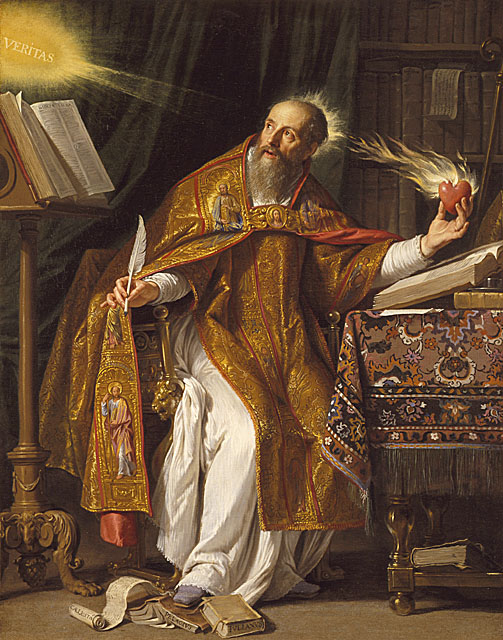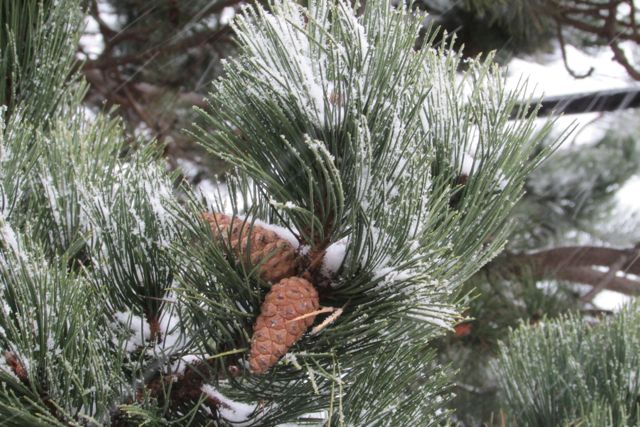My Lenten prayers for today are written by St. Augustine of Hippo (AD 354-430) which I wanted to share this afternoon.
Breathe in me, O Holy Spirit, that my thoughts may all be holy.
Act in me, O Holy Spirit, that my work, too, may be holy.
Draw my heart, O Holy Spirit, that I may love only what is holy.
Strengthen me, O Holy Spirit, that I may defend all that is holy.
Guard me, O Holy Spirit, that I myself may always be holy.
— Augustine of Hippo
The following confessional prayer of St. Augustine, is also very much in the spirit of Lent.
O Lord,
the house of my soul is narrow;
enlarge it that you may enter in.
It is ruinous, O repair it!
It displeases your sight.
I confess it, I know.
But who shall cleanse it,
to whom shall I cry but to you?
Cleanse me from my secret faults, O Lord,
and spare your servant from strange sins.
You may also like to read this sermon on Lent that Augustine wrote.
Feature Photo: By Philippe de Champaigne – http://bp3.blogger.com/_hOqI9H5CI-Y/Rd09qAhwQHI/AAAAAAAAAQM/qAeWSYW42rs/s1600-h/M88_177.jpg, Public Domain, https://commons.wikimedia.org/w/index.php?curid=6938009
As a prelude to Lent and probably throughout the season as well I plan to post prayers and reflective music to assist our journey. The second prayer in the series is by Thomas A Kempis.
The following prayer was written by Thomas A Kempis (1380-1471) the author of Imitation of Christ. Prayers like this are truly timeless and make a great addition to our Lenten prayer series.
Grant me, O Lord, to know what I ought to know,
to love what I ought to love,
to praise what delights Thee most,
to value what is precious in Thy sight,
to hate what is offensive to Thee.
Do not suffer me to judge according to the sight of my eyes,
nor to pass sentence according to the hearing of the ears of ignorant men;
but to discern with a true judgement between things visible and spiritual,
and above all things always to inquire what is the good pleasure of Thy will.
This morning I am preparing for our Lenten retreat on Saturday, thinking about what I will do for Lent and how I will prepare my own sacred space for the season. This prayer by Wendell Berry seemed very appropriate for this time of preparation. I have been meditating on the words all morning as I look out at the snow covered Olympic mountains.
What We Need Is Here
Geese appear high over us,
pass, and the sky closes. Abandon,
as in love or sleep, holds
them to their way, clear
in the ancient faith: what we need
is here. And we pray, not
for new earth or heaven, but to be
quiet in heart, and in eye,
clear. What we need is here.
Benedictines of Mary in rural Missouri produce some beautiful reflective music. It has topped the charts in classical music and as you listen to the recording below it is not hard to understand why. I just purchased their new album Lent at Ephesus for Tom’s birthday and would highly recommend it. Listening to music like this is a great way to get ready for Lent.
Lent is just a week away. Saturday is our retreat Return to Our Senses in Lent, and Wednesday next week is Ash Wednesday, the beginning of Lent. For me it feels as though Lent began a month ago however with the completion of A Journey into Wholeness and our Lenten Prayer Cards. Many of my reflections have focused on our preparation for the journey towards the cross and the practices I want to engage in for my own journey. Not surprisingly, I felt I had to write these down and the result is a new resource for the season 40+ Ideas for Lent and Holy Week
Lent is about preparing our hearts for the coming of Christ. It requires discipline and perseverance in order to fully enter into the season. This resource is provided to help maintain that discipline by suggesting daily activities, prayer ideas, and reflective music suggestions for your use.
Although this free resource is designed to be used in conjunction with A Journey into Wholeness and the Lenten Prayer Cards, it also works as a stand alone discipline.
Enjoy and if you have suggestions on how we can improve this for next year please let me know.
If you are new to this blog you might also like to check out the other resource lists that were posted last week
Daily Scripture Readings for Lent
New lists for Palm Sunday, Maundy Thursday, Good Friday and Easter Sunday will be added as Holy week approaches. If there are other resources you feel should be added to these lists please do not hesitate to add them in the comment sections.
What is obedience and more particularly, what does it mean to be obedient to God? As we head towards Lent these are questions I ask myself. The scriptures tell us Christ was obedient unto death – even death on a Cross (Phil 2:8). Many of us struggle with that concept. Did God really intend for Jesus to die and if so why such a painful death?
Obedience is about being open and receptive to the voice of God. It necessitates a willingness to listen combined with a determination to respond even when that responsiveness involves changing our lives in accordance with what we hear. It means responding, even if what we hear means walking towards death as Jesus did. Obedience to the divine will, giving priority to God’s will over our own self will means that we believe God will always reveal what is best for us. It means acknowledging that the primary task of our lives is finding God’s will and conforming to it.
This is not an easy way of life or an easy form of listening. Listening constantly for God’s will places us constantly on the alert for the slightest sound, the quietest whisper of God’s voice. It attunes us to the unexpected and often ignored voices through whom God speaks – the young, the old, the disabled, the poor, the abandoned, the inarticulate and the marginalized. These were the people that Christ so often honoured and applauded.
Unfortunately these are often not the voices that we listen to. The rich and the powerful shout loudly and often drown out other voices. They encourage us to believe that our longing for more stuff and more security are the best way to prosper and follow God. They swamp out God’s call to simplicity and justice and encourage to look for the best paying job rather than the one that is God’s will for us.
As we head towards Lent next week and prepare to follow Christ towards the Cross I wonder what would happen if we really committed ourselves to obedience. How differently would we live if we listened to the voices of the oppressed and the marginalized, to concerns about climate change and bloated consumptive lifestyles? How differently would we live if we truly committed ourselves to trust God and walk in obedience to the divine will… no matter what the cost to our personal lives?
For Jesus trusting in God led him down a very challenging path, but the scriptures also tell us that for the joy set before him he endured the cross (Hebrews 12:2).
Tom and I are on retreat in Anacortes, looking out on a snow covered landscape. I don’t usually blog while we are away on retreat, but as I contemplated God’s word this morning these thoughts bubbled up within me and I felt I needed to share. Once again I am dipping into Michael Casey’s book Strangers to the City in which he reminds us
This land is most appropriately called the land of the dying because in it nothing is stable, nothing is eternal and the life of human beings is lived in the shadow of death. (87)
Fortunately he goes on to remind us
Our Christian faith however keeps reminding us that death is the doorway to eternal life, so that there is no need to attempt to blot it out of consciousness. (90)
These have been good words for me to meditate on this morning. Not only do we live our lives in the seemingly unending shadow of death but also in the shadow of sin and brokenness. Each day contains many “little deaths”, actions that destroy not build up, times we are hateful not loving, attitudes that favour self over others.
In yesterday’s post I mentioned the Japanese art of Kintsugi in which ceramics are mended with resin infused with gold powder. This is only possible when we recognize something is both broken and valuable. When we pretend that things are not broken they cannot be renewed and transformed. When we think they are unrepairable we throw them out and often miss the beauty of what God wants to create.
Our hope lies in the fact that God offers eternal life not just in the world beyond death but here and now through the renewal of our broken areas into wholeness, through the transformation of our self centred lives into other centred and through the renewal of God’s abiding presence within us. All we need to do is acknowledge our brokenness and need for transformation – Wow imagine what is possible when we give all our broken pieces to God.
It reminds me of the words of Psalm 23 as it is expressed here in The Voice:
The Eternal is my shepherd, He cares for me always.
2 He provides me rest in rich, green fields
beside streams of refreshing water.
He soothes my fears;
3 He makes me whole again,
steering me off worn, hard paths
to roads where truth and righteousness echo His name.4 Even in the unending shadows of death’s darkness,
I am not overcome by fear.
Because You are with me in those dark moments,
near with Your protection and guidance,
I am comforted.5 You spread out a table before me,
provisions in the midst of attack from my enemies;
You care for all my needs, anointing my head with soothing, fragrant oil,
filling my cup again and again with Your grace.
6 Certainly Your faithful protection and loving provision will pursue me
where I go, always, everywhere.
I will always be with the Eternal,
in Your house forever. (From Biblegateway.com)
As an Amazon Associate, I receive a small amount for purchases made through appropriate links.
Thank you for supporting Godspace in this way.
When referencing or quoting Godspace Light, please be sure to include the Author (Christine Sine unless otherwise noted), the Title of the article or resource, the Source link where appropriate, and ©Godspacelight.com. Thank you!






